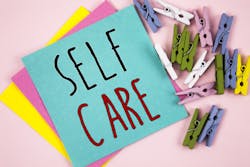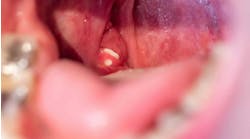A good support network is key to managing stress in our profession
Jamie Collins, RDH, CDA
Work life, home life, and personal life—how does this puzzle fit together? Finding a balance and expecting your partner at home to understand the emotional and physical challenges of dentistry can be challenging. Not every spouse or partner is able to comprehend what we do and the relationships we make with patients on a daily basis.
Let’s face it—being in the dental world, we don’t top many people’s “favorite people to see” list. How many people over the age of eight look forward to dental visits and periodontal therapy? Even so, getting to know patients and families is one of the most rewarding aspects of our careers. Work is what you make of it. It is not the physical work, but the emotional and personal connections that make my career an integrated part of my daily life. Over my years in a family-oriented practice, I have watched children grow and have seen grandchildren come into the world. I have laughed and cried along with patients. For many, we are as much a listening ear as we are clinicians, so getting emotionally invested in patients is almost inevitable.
The stress we feel as hygienists may carry over into the home when we switch to our roles as moms, dads, spouses, and partners, and it can be overwhelming at times. I admit I don’t always transition from wearing one hat to another smoothly. Hygienists are often perfectionists. Feeling like we need to do it all is frustrating, and overcoming that feeling can be hard. But how do we get our significant others to see and understand the stressors of the dental profession?
The stress of running behind schedule, having patients tell us how much they dread a dental visit, and dealing with an office full of difficult coworkers and an overpowering doctor is enough to cause anybody’s head to spin. Office conflict and lack of teamwork can make any day miserable when the office is not running smoothly. That said, hygiene is a rewarding, satisfying career spent caring for others and seeing the changes that we make in patients’ lives, while creating new relationships and friendships with coworkers and patients alike.
Over the years, I have sometimes come home to cry on my husband’s shoulder about the divorce of a sweet couple or the death of a beloved patient (without revealing inappropriate details, of course). He has often looked at me with bewilderment, wondering why I cared so much about these people who were “just paying clients.” In turn, I stared back through teary eyes, wondering how he couldn’t understand why I felt sad or overwhelmed. He works in the corporate world separated by cubicles, and he doesn’t have the experience or the understanding of caring for others.
Having a patient sit in my chair two weeks after his wife ended her life, leaving him to care for their two children alone—one who is autistic like my own child—plays on the heartstrings. Needless to say, I ran behind schedule as I sat and cried with him and offered to take dinner to his family the following week. My husband didn’t understand why I spent a day making a meal for a family that I saw only a few times a year, but it made an impact on my patient’s life and mine.
One of the most memorable moments of my career was when Diane, a favorite patient, came in to tell me she was diagnosed with cancer and a big concern was to keep her teeth. I delivered a goody bag to her the next day with an assortment of products to help ease mucositis and xerostomia during treatment, and shortly thereafter she sent me a letter with a review of how each worked for her. During the course of treatment I would drop a card in the mail to her and her husband to let them know they were in my thoughts. One day Diane’s husband called me at work to tell me she was in the hospital and they were removing life support, and he felt I should know. I sat on the phone crying with him and afterward had to pull myself together for the next patient in my schedule. That evening my husband could not understand why a patient felt the need to call me with the news . . . until he heard us on the phone the following day, when her husband called to tell me she had passed. My husband, after 15 years together, had his aha moment and realized not only what my patients mean to me but also the impact I have had on their lives—he looked at me and said, “I get it now.”
These past 12 months have proved to be some of the most challenging of my career, with the last few being especially hard on the emotions. My husband’s career has taken us to another state, and I left behind an amazing office that I had been at for nearly 10 years. It was a dream office, where the doctor was down-to-earth and supportive, the staff were all friends, and it was altogether a great place to be. I accepted a position near my new home in an office that sounded great on paper, but I found myself walking into staff turmoil, where nobody worked as a team. It was extremely challenging. On top of that, the doctor would stand at the doorway to the operatory and micromanage every procedure. I knew quickly it was not the dental home for me and that I would dread the days I worked, all while quietly keeping my options open.
Being in a new town and a new dental community, I was unsure of who was great to work for and who to avoid. In such a small work environment, there are bound to be differences in opinions and theories, and any office may be great for some but not for others. The beauty of our field is that we can find those great offices to be in, and the career is what you make of it. Our journeys are unique and not all hygienists are made to work their entire careers in a clinical setting. Even though it was not the place for me to work long-term, I made a great friendship with a coworker and am thankful for the experience.
I chose to give that position six months, and ultimately I moved to another position that aligned with my philosophy. After two short months there, tragedy struck the young doctor’s family when he was diagnosed with stage IV cancer. He stopped work immediately to undergo treatment. Through our tears, the staff has picked up the pieces and worked to keep the practice up and going while the doctor is in treatment. That meant coordinating other specialists to come in and help with procedures, changing my hours to accommodate the crazy schedule, and going above and beyond the regular duties.
We have been able to keep the doors open and the patients treated by reaching out to the local dental community in my new hometown and requesting help from the board of dentistry. Finding and coordinating help is uncharted territory for the staff. However, in the month that this has been happening, we have been able to function well together, all while relying on our spouses for support at home to pick up the pieces with family life. I have been humbled and touched by the local dental community banding together to support the office and the doctor, with everything from financial support to donating time to treat patients, expecting nothing in return. The outpouring of support has surpassed anyone’s expectations. The local hygiene study group raised funds at a meeting to contribute. It has shown me what an amazing, generous, and caring profession I have chosen.
Dealing with stress in a productive manner and being able to express the daily rigors to your significant other is imperative to your physical and emotional well-being. Effective communication is essential, whether it is in relationships, friendships, or working environments. We may assume too much without the facts or understanding of others, and it can impact relationships around us. After a hard day with high-maintenance patients, I sometimes come home cranky and not wanting to do anything, and being able to ask for help is something that I had to learn to do and still need to work on.
When we add the stress of children, spouses, or parents who require care and attention, self-care may go to the end of the list. Being a hygienist is often synonymous with being an overachiever, and learning to express your limits to others is challenging. I take on too much and want to please and accommodate everyone, which often means that I am burning the candle at both ends to get it all done. These days I am better able to communicate with my spouse when I need help or feel overwhelmed, and he understands the emotions that surround the profession of caring for others. Whether his understanding and support comes in the form of a hug, making dinner, or getting the kids to bed, it relieves even the biggest burden. It is true that the little things matter.
For some of us, relaxation and the ability to decompress come in the form of exercise, and for others it may be a good book and glass of wine after the kids go to bed. Online groups can provide a positive and encouraging sounding board of like-minded professionals. Joining online groups such as Trapped in the Op and Sister Tribe have provided a dose of encouragement in my daily life. Even if you are not active in the group, reading the encouragement and experiences of others can be uplifting. Having a supportive network, whether it is in the form of a partner, friends, church, or an online group not only helps ease the pressure of daily life, but also provides a kinship with others. Life is full of ups and downs . . . make the most of each day and appreciate the impact you have made on lives of others.
Jamie Collins, RDH, CDA, is a clinical practicing hygienist in Idaho and Washington states. She has been in the dental field for nearly 20 years both as an assistant and hygienist. With a passion for patient care, especially those with higher risk factors, Jamie enjoys sharing the tips and tricks of dental profession through speaking and writing. In addition to clinical practice, Jamie is also an educator. She has contributed to textbooks and curriculum development projects as a key opinion leader. Collins can be contacted at [email protected].








